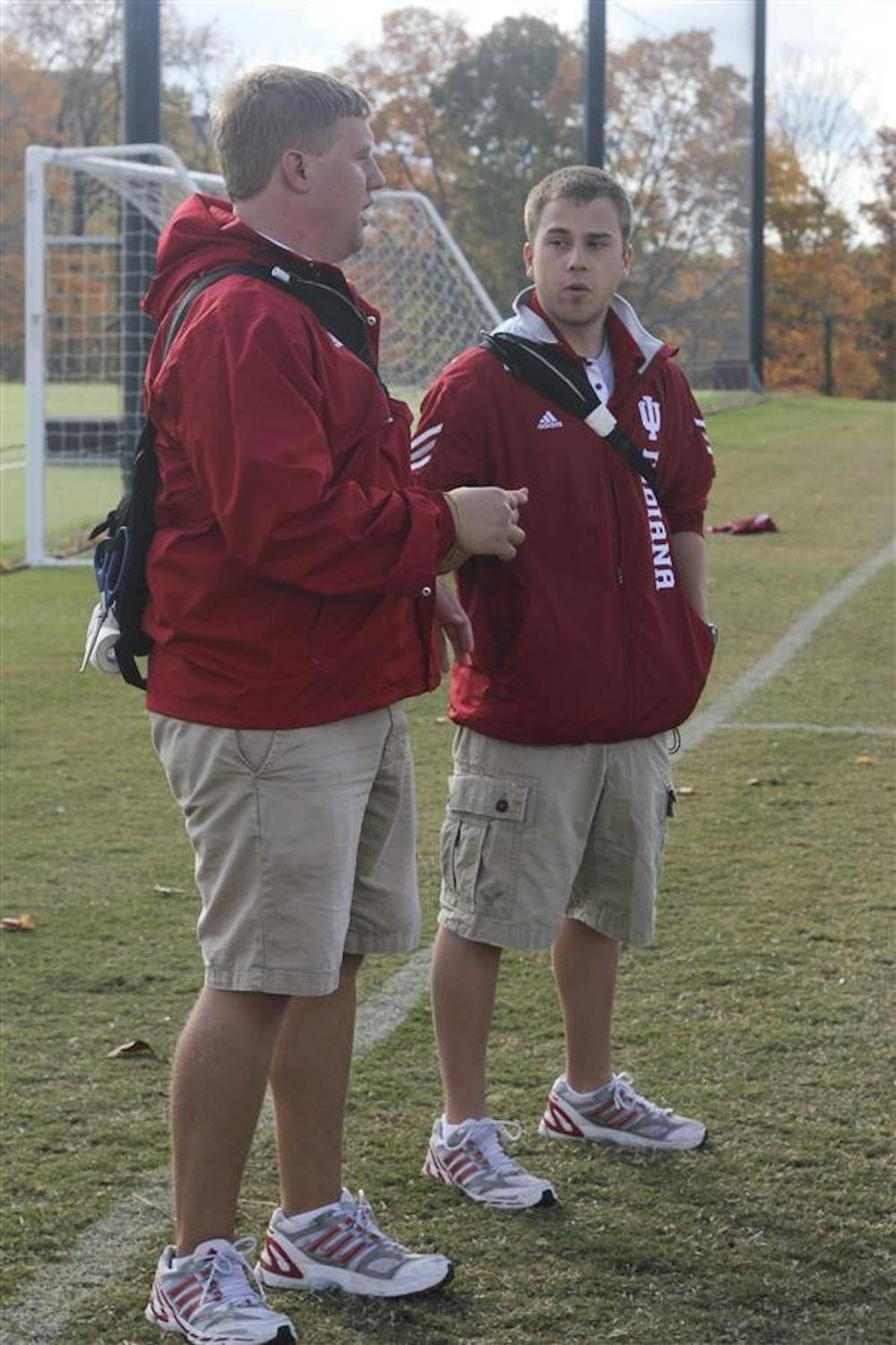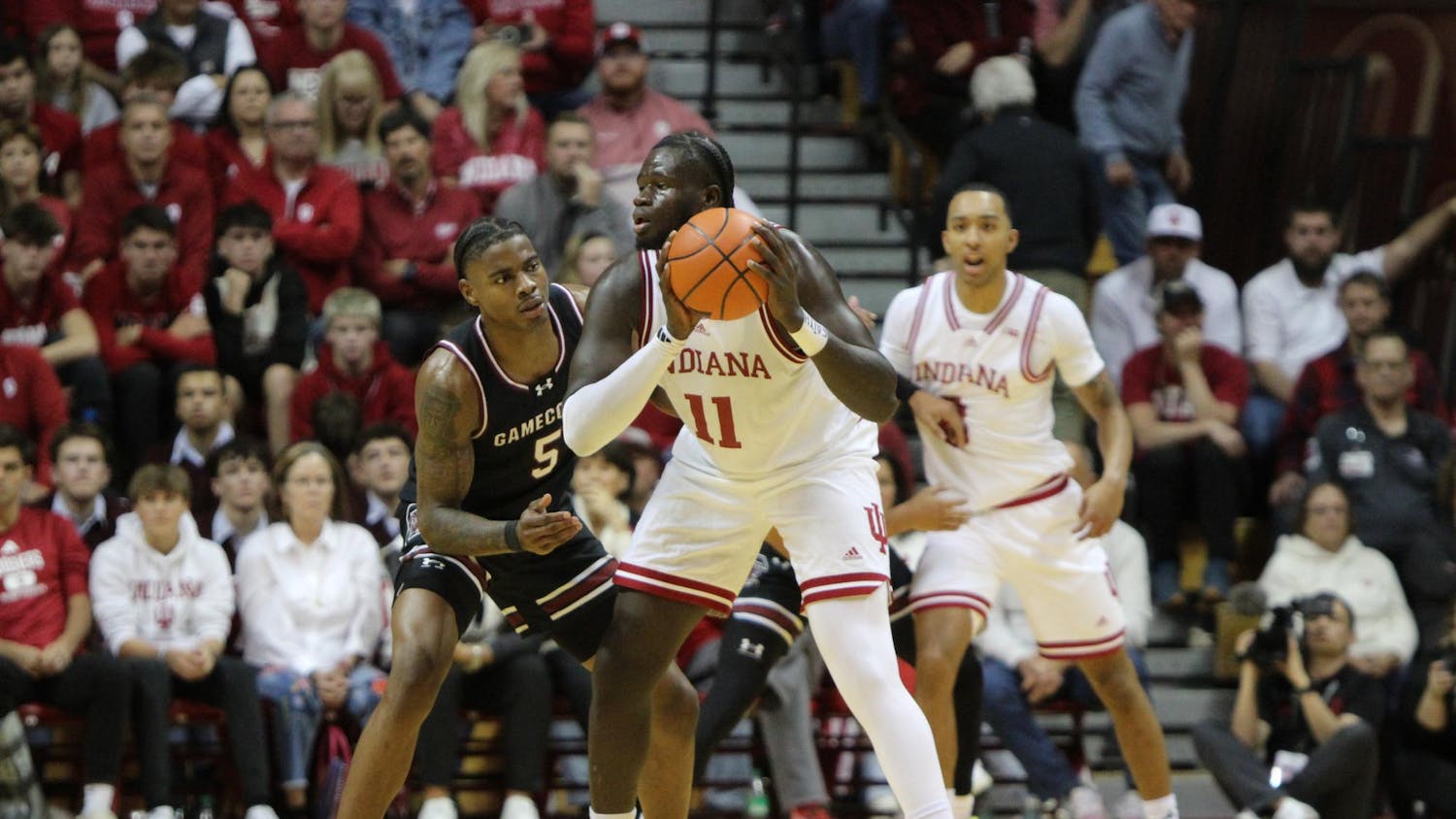Beyond the diagnosis and treatment of injury, a large part of an athletic trainer’s job is to be discrete.
Business between a trainer and an athlete is a very private matter and can often go unmentioned outside of the confines of the team.
Senior athletic trainer Jacob Janicki, who is in his second season with the men’s soccer team, approached freshman midfielder Harrison Petts at practice Monday with an orange cooler of ice water for a discrete treatment unbeknownst to Petts or
his teammates.
Petts’ neck stiffened and his back arched as Janicki dumped the chilly water on the surprised freshman, an unexpected 19th birthday gift from the training staff. Petts sat frozen, his white practice jersey clinging to his wet back, and the breezy fall day suddenly became a bit more noticeable to the birthday boy.
“It’s a fun job,” Janicki said. “One of the great things about the program is you meet a lot of really cool people, so you have a good group of people you get to hang out with and become close with.”
While Janicki said he enjoys what he does, his job is certainly a serious one.
For three years, Janicki has dedicated much of his time to sports medicine as an athletic trainer. Unknown by most outside the men’s soccer program, Janicki’s role is vital: make sure the team is as healthy as possible to make a push for a conference title and NCAA berth.
“We’re responsible for injuries,” the 21-year-old from Indianapolis said. “We’re responsible for the immediate care of injuries, the assessment of injuries, working with a player to keep them playing even while they have injuries and rehabbing players back to health so they can play at 100 percent. We need to be prepared for whatever might happen during games or practices.”
Being prepared is a full-time job that includes taping, stretching, icing, heating,
mending wounds, wrapping joints, massaging, electrotherapy and rehabilitating.
Janicki’s day entails classes in the mornings, working in the training room or with the team from 2 p.m. until 6 p.m., followed by homework and studying at night.
“Being an athletic trainer is a lot like being a student-athlete,” he said. “We put in at least as much time, if not more. We’re there before practice and after practice. It’s about the same time requirement as an athlete.”
But unlike the athletes he treats, Janicki does not receive compensation in the form of scholarships, food stipends, preferential class scheduling or anything of the sort.
“The incentive to be a student athletic trainer is this is what you want to do for your career,” head athletic trainer Joe Lueken. “He is getting a world of experience here. They put in tons of hours, they get some gear, but that’s about it. So they truly are unsung heroes because they do all the work behind the scenes that a lot of people don’t see and they don’t get much for it besides their education.”
Overall, a senior undergraduate trainer puts in about 20 hours per week, Lueken said.
Janicki’s main responsibility is to prevent and treat the ailments and afflictions that fall upon the team, but his worth goes far beyond the typical responsibilities of a trainer.
“I put them in charge of several things throughout the course of the semester,” Lueken said. “Not only is he doing evaluations on the field and doing treatments with the students who are hurt, but he’s also helping with administrative roles and other responsibilities: game set up, practice set up, everything that goes into it.”
As the undergraduate overseer of the team’s health, Janicki’s younger colleagues said they see him as a role model and teacher.
Brad Eppelheimer is a junior in his fourth week of his rotation with the team. Unlike Janicki, who works with the team year-round, Eppelheimer’s tenure with men’s soccer only lasts through the semester’s end.
“Really a lot of what Jake’s taught is how to progress through treatments,” Eppelheimer said. “I know how to treat, but not necessarily what progressions to go through, so Jake has been a pretty good resource for figuring out where to go next.”
After Petts’ ice bath, the mood was light at the Monday practice. It was the day after IU beat No. 16 Michigan State 3-0 on the road, and for the starters, it was an easy day off.
But for Janicki, it was back to work.
“The important thing is you’ve got to realize you need to be ready at all times just in case something does happen because eventually something will happen,” he said with a black first aid kit draped over his shoulder. “You have to make sure you’re ready for whatever it might be.”
Soccer training staff provides students real-world training experience with sports teams

Get stories like this in your inbox
Subscribe



